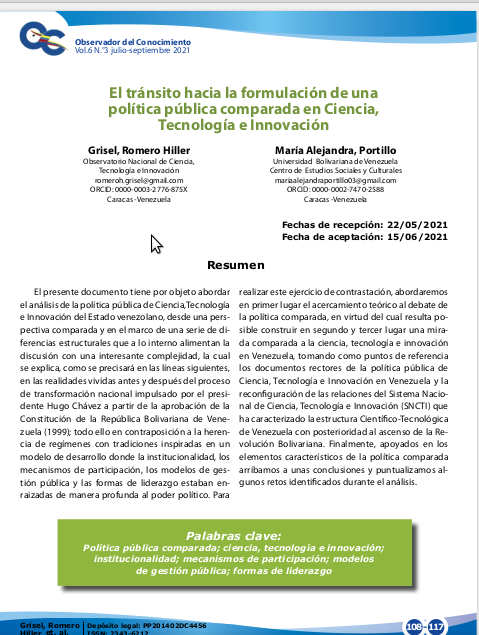The transit towards the formulation of a comparative public policy in science, technology, and innovation
Keywords:
Comparative public policy, science, technology and innovation, institution, participatory mechanisms, models of public management, forms of leadershipAbstract
This paper aims to analyze Venezuela's public policy in the field of Science, Technology, and Innovation from a comparative perspective and within the framework of structural differences at the national level that foster an interesting and complex discussion. This discussion is based on experiences before and after the process of national transformation promoted by president Hugo Chávez since the approval of the Bolivarian Constitution in 1999; in contrast to previous regimes that promoted development models with institutions, participatory mechanisms, public management models, and leadership styles, which heavily relied on the political power. In order to achieve this task, a review of theoretical debates on comparative politics was carried out. It allowed the construction of a comparative perspective, taking as references official documents regarding Venezuela's public policy in Science, Technology, and Innovation and the reconfiguration of the relations of the National System of Science, Technology, and Innovation (SNCTI) that has characterized Venezuela's scientific-technological structure after the rise of the Bolivarian Revolution. Finally, the conclusions and challenges identified throughout the analysis are presented.
Downloads
References
Asamblea Nacional. (1999). Constitución de la República Bolivariana de Venezuela. Caracas, Venezuela.
Asamblea Nacional. (2007). Plan de dearrolo conómico y social de la nación 2007-2013. Caracas.
Asamblea Nacional. (2013). Plan de desarrollo económico y social de la nación 2013-2019. Caracas.
Asamblea Nacional. (2014). Ley Orgánica de Ciencia Tecnología e Innovación. Caracas, Venezuela.
Borrego, O. (2014). El trabajo de dirección en el socialismo. Antecedentes y enfoques actuales. Caracas: Fundación El perro y la rana.
King, G., Keohane, R. O., y Verba, S. (1994). Designing social inquiry: Scientific inference in qualitative research. Princeton, New Jersey, United States: Princeton university press.
Lijphart, A. (1971). Comparative politics and the comparative method.American Political Science Review, 65(3), 682-693.
Mair, P. (2001). Política comparada: una visión general. En R. Gooddin, y H. Klingemann, (Eds.), Nuevo manual de ciencia política, (Vol. 1, p. 447). Madrid, España: Istmo.
Morlino, L. (2010). Introducción a la investigación comparada. Madrid, España: Alianza Editorial.
Ochoa, H y Estévez A. (2006). El poder de los expertos: para comprender la tecnocracia. Centro de Estudios de la empresa. Facultad de Ciencias Económicas y Sociales. Universidad del Zulia. Maracaibo-Venezuela.
Pérez Liñán, A. (2008). Cuatro razones para comparar. Boletín de Política Comparada, 1, 4-8. Recuperado en: https://es.scribd.com/ document/13200534/Politica-Comparada
Romero, G. y Zavarce C. (2021). La gestión social de Ciencia, Tecnología e Innovación en el Estado venezolano. Caracas, Venezuela: Fondo Editorial Ediciones Oncti.
Sartori, G. (2011). Cómo hacer ciencia política: lógica, método y lenguaje en las ciencias sociales (Trad. M.A. Ruiz). Madrid, España: Taurus.
Zavarce, C (2020). Business Politics and the State in Twentieth-Century Latin America. Book Report,Tohoku University, Graduate School of Law.

Downloads
Published
How to Cite
Issue
Section
License

This work is licensed under a Creative Commons Attribution-NoDerivatives 4.0 International License.







